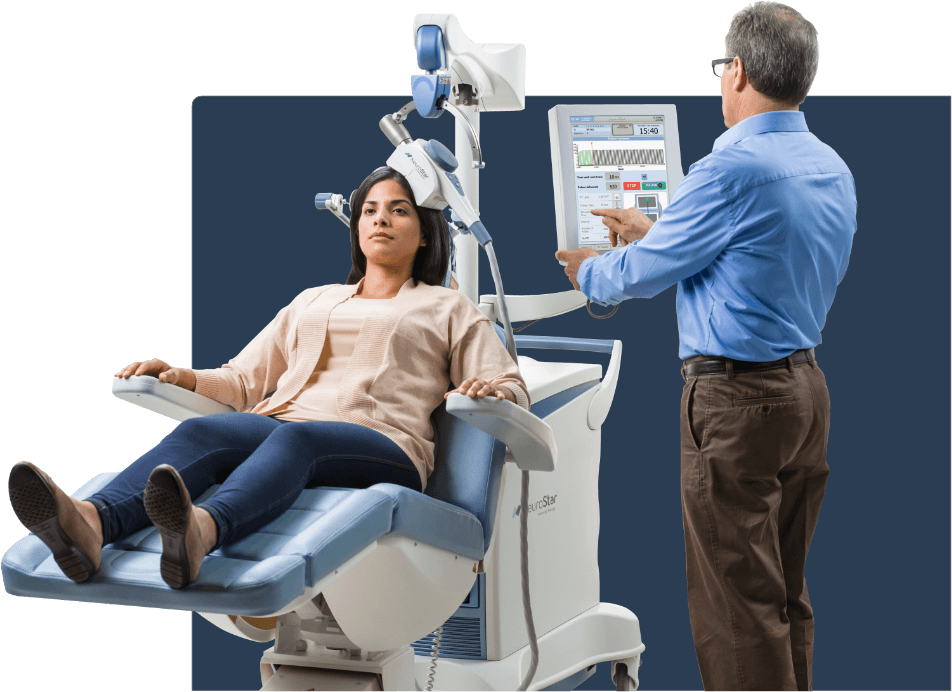Transcranial Magnetic Stimulation (TMS) therapy is known as the brain stimulation therapy without side effects. With over three million treatments delivered, TMS treatment has shown statistically significant improvements in mental health disorders, especially depression. It has been FDA-approved since 2008 and has since provided long-lasting symptom relief for many patients.
What Is TMS Therapy, and How Does It Work?
TMS is a noninvasive treatment for mental health conditions, primarily depression. Using focused magnetic stimulation, TMS works to activate specific parts of the brain. This stimulation can release neurotransmitters and reduce symptoms of various conditions.
During a TMS session, you will lie in a treatment chair with a small magnetic coil on your head. Our TMS treatment targets a specific area of the brain. The process is painless — all you may feel is a tapping sensation.
Following a session, you can resume normal activities immediately with no side effects impacting your alertness or memory. Your session can take around 18 minutes. On average, patients schedule treatments five times a week for four to six weeks and begin to feel improvements after six weeks.
Who Can Benefit from TMS?
TMS therapy can help many individuals struggling with persistent depression. It has shown benefits for patients with obsessive-compulsive disorder (OCD), post-traumatic stress disorder (PTSD), schizophrenia, and even chronic migraines. At Yang Institute’s mental health clinics, our psychiatrists most often recommend TMS for treatment-resistant depression — when medications, psychotherapy, or other treatments have not provided lasting relief. As part of our integrative psychiatry approach, TMS offers a safe, non-invasive option to restore brain function, improve mood, and help you feel like yourself again.

TMS Therapy for Depression
Advantages of TMS Treatment for Depression
TMS therapy for depression can be the best next step toward feeling more like yourself again. Some advantages of choosing TMS include:
- Covered by insurance: Most health plans, including Medicare and Tricare, cover TMS.
- No systemic side effects: TMS allows you to return to normal activities right away.
- Medication-free: You can now live free of anti-depressants and their frustrating side effects.
- Safe: TMS is FDA-approved and follows high standards of safety.
- Low maintenance: Treatment sessions are quick and easy, requiring no physical or emotional demands on your part.
Why Choose TMS Therapy at Yang Institute?
Yang Institute was one of the first mental health practices to use TMS. Since 2008, we’ve used TMS therapy, as well as acupuncture, advanced nutrient therapy, neurofeedback and meditation, to help patients with mood disorders. If you are eligible, our billing specialist can help you obtain authorization from your insurance.
Over the years, we have seen many patients experience their unique success stories. We pair TMS with our integrative approach, inviting patients to look at their illness through their mind, body and spirit. Together, we can help you determine the right treatment schedule that works for you.
The TMS went a lot better than I had expected. (There was) minimal discomfort and overall pretty easy to tolerate. My mood, mentality and everything changed to a much more positive feeling. I feel very confident and much happier now. My family and friends noticed I smile much more with a happy glow to me.
-RachelGet Started With Yang Institute Today
Yang Institute makes it easy to schedule your consultation, where we will see if you meet the medical requirements for TMS. From here, a board-certified psychiatrist will evaluate you and provide an authorized health plan. Find TMS therapy near you in Bryn Mawr, PA, and Marlton, NJ or the Greater Philadelphia area.
